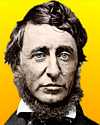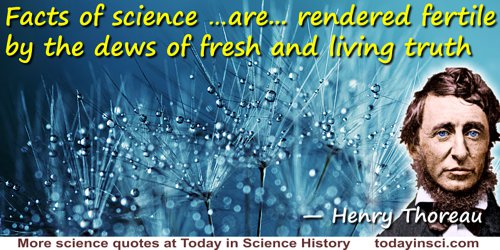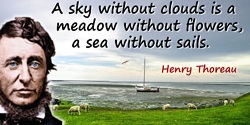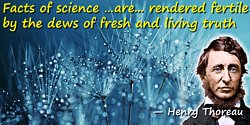 (source)
(source)
|
Henry Thoreau
(12 Jul 1817 - 6 May 1862)
American writer, naturalist, philosopher and poet who is best known for his study of nature, while retired to live in a hut beside Walden Pond at Concord (4 Jul 1845-6 Sep 1847). Thereafter, he wrote two books: A Week on the Concord and Merrimack Rivers (1849) and Walden, or Life in the Woods (1854).
|
Henry Thoreau Quotes on Science (20 quotes)
>> Click for 92 Science Quotes by Henry Thoreau
>> Click for Henry Thoreau Quotes on | Fact | Law | Life | Nature | Truth |
>> Click for 92 Science Quotes by Henry Thoreau
>> Click for Henry Thoreau Quotes on | Fact | Law | Life | Nature | Truth |
Even the facts of science may dust the mind by their dryness, unless they are … rendered fertile by the dews of fresh and living truth. Knowledge does not come to us by details, but in flashes of light from heaven.
— Henry Thoreau
Essay, first published as 'Life Without Principle', Atlantic Monthly (Oct 1863). Collected in Yankee in Canada, Etc., (1866) 267. Also excerpted in H.G.O. Blake (ed.), Thoreau's Thoughts: Selections From the Writings of Henry David Thoreau (1890, 2005), 102.
Every man will be a poet if he can; otherwise a philosopher or man of science. This proves the superiority of the poet.
— Henry Thoreau
Odell Shepard (Ed.), The Heart of Thoreau's Journals (1961), 84.
Every poet has trembled on the verge of science.
— Henry Thoreau
Journal entry (18 Jul 1852). Collected in The Writings of Henry David Thoreau (1906), Vol. 10, 239.
Fishing has been styled “a contemplative man’s recreation,” … and science is only a more contemplative man’s recreation.
— Henry Thoreau
In A Week on the Concord and Merrimack Rivers (1862), 28.
He is not a true man of science who does not bring some sympathy to his studies, and expect to learn something by behavior as well as by application. It is childish to rest in the discovery of mere coincidences, or of partial and extraneous laws.
— Henry Thoreau
In A Week on the Concord and Merrimack Rivers (1862), 381.
He who is only a traveler learns things at second-hand and by the halves, and is poor authority. We are most interested when science reports what those men already know practically or instinctively, for that alone is a true humanity.
— Henry Thoreau
In 'Higher Laws', in Walden: Or, Life in the Woods (1854, 1899), 239.
Man cannot afford to be a naturalist, to look at Nature directly, but only with the side of his eye. He must look through and beyond her, to look at her is fatal as to look at the head of Medusa. It turns the man of science to stone. I feel that I am dissipated by so many observations. I should be the magnet in the midst of all this dust and filings.
— Henry Thoreau
From Journal entry (23 Mar 1953), in Henry David Thoreau and Bradford Torrey (ed.), Journal (1906), Vol. 5, 45.
Men are probably nearer the essential truth in their superstitions than in their science.
— Henry Thoreau
Journal, 27 Jun 1852, in The Writings of Henry David Thoreau (1906), Vol. 10, 158.
Men have been talking now for a week at the post office about the age of the great elm, as a matter interesting but impossible to be determined. The very choppers and travelers have stood upon its prostrate trunk and speculated upon its age, as if it were a profound mystery. I stooped and read its years to them (127 at nine and a half feet), but they heard me as the wind that once sighed through its branches. They still surmised that it might be two hundred years old, but they never stooped to read the inscription. Truly they love darkness rather than light. One said it was probably one hundred and fifty, for he had heard somebody say that for fifty years the elm grew, for fifty it stood still, and for fifty it was dying. (Wonder what portion of his career he stood still!) Truly all men are not men of science. They dwell within an integument of prejudice thicker than the bark of the cork-tree, but it is valuable chiefly to stop bottles with. Tied to their buoyant prejudices, they keep themselves afloat when honest swimmers sink.
— Henry Thoreau
(26 Jan 1856). In Henry David Thoreau and Bradford Torrey (ed.), The Writings of Henry Thoreau: Journal: VIII: November 1, 1855-August 15, 1856 (1906), 145-146.
Much is said about the progress of science in these centuries. I should say that the useful results of science had accumulated, but that there had been no accumulation of knowledge, strictly speaking, for posterity; for knowledge is to be acquired only by corresponding experience. How can be know what we are told merely? Each man can interpret another’s experience only by his own.
— Henry Thoreau
In A Week on the Concord and Merrimack Rivers (1862), 384.
Our science, so called, is always more barren and mixed with error than our sympathies.
— Henry Thoreau
In Early Spring in Massachusetts: From the Journal of Henry Thoreau (1881), 26.
Science never saw a ghost, nor does it look for any, but it sees everywhere the traces, and it is itself the agent, of a Universal Intelligence.
— Henry Thoreau
(2 Dec 1853). In Henry David Thoreau and Bradford Torrey (ed.), The Writings of Henry Thoreau: Journal: VI: December 1, 1853-August 31, 1854 (1906), 4.
The fact which interests us most is the life of the naturalist. The purest science is still biographical.
— Henry Thoreau
In A Week on the Concord and Merrimack Rivers (1862), 382.
The most distinct and beautiful statement of any truth [in science] must take at last the mathematical form.
— Henry Thoreau
A Week on the Concord and Merrimack Rivers (1862), 381.
The science of Humboldt is one thing, poetry is another thing. The poet to-day, notwithstanding all the discoveries of science, and the accumulated... ?
— Henry Thoreau
The Columbia World of Quotations. 1996
The true man of science will know nature better by his finer organization; he will smell, taste, see, hear, feel, better than other men. His will be a deeper and finer experience.
— Henry Thoreau
In 'Natural history of Massachusetts', The Dial: A Magazine for Literature, Philosophy, and Religion (Jul 1842), 3, No. 1, 40.
There is more religion in men’s science than there is science in their religion.
— Henry Thoreau
In A Week on the Concord and Merrimack Rivers (1862), 82.
What are the libraries of science but files of newspapers?
— Henry Thoreau
Excursions, 203. Excerpt in H.G.O. Blake (ed.), Thoreau's Thoughts: Selections From the Writings of Henry David Thoreau (1890,2005), 91.
With all your science can you tell how it is, and whence it is, that light comes into the soul?
— Henry Thoreau
(16 Jul 1851). In Henry David Thoreau and Bradford Torrey (ed.), The Writings of Henry Thoreau: Journal: II: 1850-September 15, 1851 (1906), 307.
You can hardly convince a man of error in a life-time, but must content yourself with the reflection that the progress of science is slow. If he is not convinced, his grand-children may be. The geologists tell us that it took one hundred years to prove that fossils are organic, and one hundred and fifty more, to prove that they are not to be referred to the Noachian deluge.
— Henry Thoreau
In A Week on the Concord and Merrimack Rivers (1862), 68.
See also:
- 12 Jul - short biography, births, deaths and events on date of Thoreau's birth.
- Henry Thoreau - context of quote “Dews of fresh and living truth” - Medium image (500 x 250 px)
- Henry Thoreau - context of quote “Dews of fresh and living truth” - Large image (800 x 400 px)




 In science it often happens that scientists say, 'You know that's a really good argument; my position is mistaken,' and then they would actually change their minds and you never hear that old view from them again. They really do it. It doesn't happen as often as it should, because scientists are human and change is sometimes painful. But it happens every day. I cannot recall the last time something like that happened in politics or religion.
(1987) --
In science it often happens that scientists say, 'You know that's a really good argument; my position is mistaken,' and then they would actually change their minds and you never hear that old view from them again. They really do it. It doesn't happen as often as it should, because scientists are human and change is sometimes painful. But it happens every day. I cannot recall the last time something like that happened in politics or religion.
(1987) -- 


